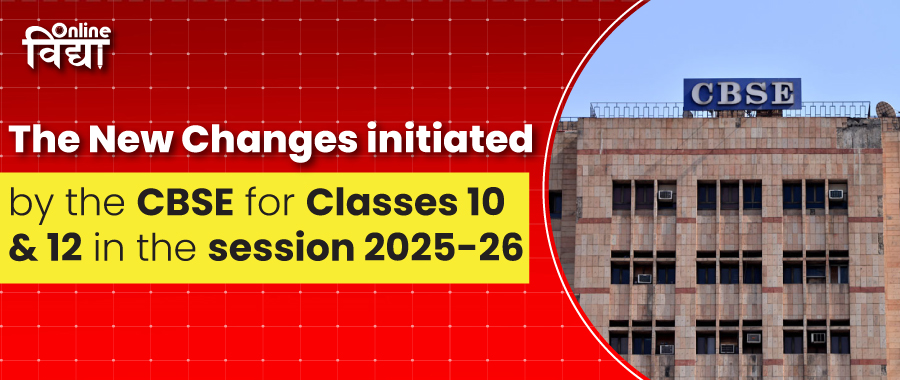Specializations
Courses Available
Courses

The New Changes initiated by the CBSE for Classes 10 & 12 in the session 2025-26
The New Changes initiated by the CBSE for Classes 10 & 12 in the session 2025-26,Apr 02, 2025
Information
Apr 02, 2025
1817 Views
- Share:
With the introduction of new skill-based subjects, the curriculum for Classes 10 and 12 has been revised for the academic session 2025-26, along with changes in exam dates, grading systems, and criteria for passing.
After this latest update by the CBSE, schools need to put in place a new method to the syllabus, teaching, and assignment submission to offer engagement and meaningful studies.
There are two board exams for students in class 10.
Class 10 students will have the choice of appearing for two board exams in a year from the 2025–2026 academic session: one in February and the other in April. Within the same school year, the scheme aims to give students an additional chance to improve their marks.
It is important to recall that this policy is currently in draft form and that the actual version has yet to be signed off.
The 2026 examinations will begin on February 17, and the Class 12 board exams will continue to be conducted annually.
Classes 10 And 12 Revised Grading System
For the Class 10 and Class 12 board examinations, CBSE is adopting a 9-point marking system. One seat of grading will be awarded to each 1/8th of the students who passed.
Grade | Octile |
A1 | Top ⅛ of the passed students |
A2 | Next ⅛ of the passed students |
B1 | Next ⅛ of the passed students |
B2 | Next ⅛ of the passed students |
C1 | Next ⅛ of the passed students |
C2 | Next ⅛ of the passed students |
D1 | Next ⅛ of the passed students |
D2 | Next ⅛ of the passed students |
E | *Essential Repeat |
Exam marks will be better reflected as grades under this system, offering a better overview of students' performance.
This aims to better reflect students' knowledge and capabilities and supersedes the outdated five-point system.
Class 10 Passing Criteria
Students have to score a minimum of 33% in each subject in order to clear the Class 10 board examinations.
If an examination student achieves a language or skill-based elective but not a core subject such as science, mathematics, social science, or a language paper, the failing subject could be substituted with the passing language or skill to determine the result.
If a student is successful in a skill-based subject but not in mathematics, for example, the marks of the skill-based subject will replace the marks of mathematics.
Overview Of Class 10's Skill-Based Subjects
With the inclusion of courses such as Computer Applications (Code 165), Information Technology (Code 402), and Artificial Intelligence (Code 417) for Class 10 students, CBSE is placing greater emphasis on skill-based education.
Along with this, while studying Classes 9 and 10, one of the two languages needs to be chosen: Hindi or English.
Class 12 New Skill Electives
CBSE has introduced four new skill electives for students of Class 12, following the dynamic shift in the way education has started to turn towards:
- Associate in Land Transportation
- Hardware and Electronics
- Trainer of Physical Activity
- Innovation and Design Thinking
These enhancements aim to provide students with practical skills relevant to a variety of industries.
Class 12 Accountancy Exams And Calculator Use
As per data from a CBSE conference, the organization would permit the use of basic, non-programmable calculators in Class 12 Accountancy board exams starting in the 2025–2026 academic year as part of an attempt to assist students in coping with complex financial calculations.
New instructional methods focus on hands-on skills.
In its latest notice to the principals of all the associated schools, CBSE says that the board is promoting a shift in the method of learning of children by fostering inquiry-based and experiential learning.
Schools now have to put into practice:
- With project-based learning, students will be working on real problems instead of merely reading about them.
- Students will be encouraged to ask questions and answers through an inquiry-based learning model instead of memorizing facts.
- Tech-enabled learning: Web-based systems, digital resources, and artificial intelligence technologies will all be used more in instruction.
- Collaborative lesson planning: Teachers will change their methods in real time to meet students' evolving needs.
The goal is to move the focus from memorization to understanding, problem-solving, and critical thinking.
Assessments are transformed into evaluations based on competency.
Furthermore, CBSE is revising how students are assessed. Tests will now focus more on true understanding and utilization of knowledge as opposed to merely testing memory. Schools will design tests that measure:
- Critical thinking
- Analytical skills
- Concept clarity
- Knowledge applied practically
By making learning more meaningful, this change aims to more effectively prepare students for postsecondary education and careers.
Getting In To The New Syllabus
Curricula have been uploaded on the academic website of CBSE for classes 9 to 12. These documents need to be understood by students, parents, and teachers to orient themselves to the new assessment and curriculum frameworks.
This new framework proves that CBSE is serious about bringing something comprehensive and skill-based to its students as preparation for future academic or professional endeavors.

Meet Our Counselling Experts
Get 100% Free Career Counseling




PlacementPartners










Schedule Your 30 min Couselling Session With Today!!
Select a Date of your choice :
You Have Selected Slot on .

